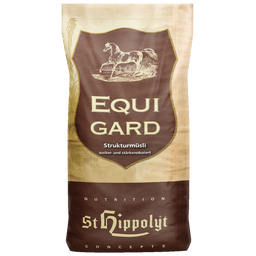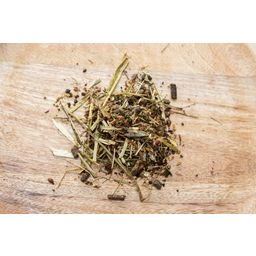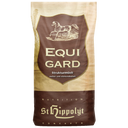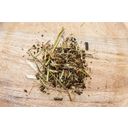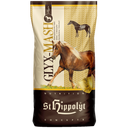St.Hippolyt Equigard Muesli, 20 kg
Special mineralisation to stabilise carbohydrate and fat metabolism
€ 35,99 € 39,99 -10%
(€ 1,80 / kg, Price shown includes 13% VAT.
Features & Advantages
- Grain free & low-carb
- Low starch and sugar content
- For light-feeders or overweight horses
Description
Overweight and light-fed horses need precisely balanced nutrients and calories when it comes to their feed.
With Equigard, St. Hippolyt has created a grain-free and low-energy formula which contributes to stabilising carbohydrate and fat metabolism. The particularly low starch and sugar content makes this feed especially suitable for light-work or light-feeding and overweight horses.
Features:
- Rich in low-glycaemic fibre
- Made with herbs, seaweed, oils and oleaginous fruits
Suitable for:
- Overweight and light-work horses
- Horses that need to be fed a low-sugar and low-starch diet
- For use during convalescence
Feeding recommendations:
- Use as a supplement to your horse's basic feed supply with roughage and/or pasture grass.
- From a quantity of approx. 200-350 g per 100 kg body weight per day, no additional mineral feed is necessary.
- For older horses, hasty eaters or horses with tooth problems, chewing or throat problems, it is recommended to add water to the Equigard mix.
- Distribute the Equigard into several rations throughout the day.
- For lower dosages or for deficits, the manufacturer recommends adding Glucogard or MicroVital to your horse's diet.
- For increased energy requirements (for performance horses), combine Equigard with Structure-E® Grain-Free and vegetable oils.
- 1 litre corresponds to approx. 400 g Equigard Muesli
| Item no.: | ASS-10130 |
|---|---|
| Content: | 20 kg |
| Manufacturer No.: | 053005 |
| Brands: | St.Hippolyt |
| Type of Feed: | Complete feed |
| Type of Horse: | All Horses |
| Storage information: | Store in a cool, dry place away from light |
| Areas of use: | Metabolism, Vitamins, minerals & trace elements |
Composition
22 % Warm-air-dried grass chaff (low glycemic), Apple pomace, Beet fibres, 4,4 % Linseeds, Apple syrup, Maize germ, 3,5 % Oil seed mix (Flax oil, Sunflower oil, Corn Oil), 3 % Herbs (Real Chamomile, Fennel, Rosemary , Coriander, Fenugreek Seeds , Milk Thistle), Lucerne chaff, Beer yeast, 1,5 % Isomaltose prebiotic, Grape seed extract, Rice bran, Salt, Calciumcarbonat (maritime and mineral), Carrot, Garlic, Seaweed meal
Components
Ingredients/Digestibility
| Components | |
|---|---|
| Raw protein | 9,6 % |
| Crude fibre | 17 % |
| Crude fat | 8 % |
| Crude ash | 12,5 % |
| Digestible crude protein | 77 g |
| Digestible energy | 8,5 mg |
| Calcium | 1,2 % |
| Phosphorus | 0,5 % |
| Magnesium | 0,6 % |
| Sodium | 0,45 % |
| Starch | 3 % |
| Sugar | 6 % |
Nutritional additives per kg
| Components | |
|---|---|
| Vitamin A | 16.000 UI |
| Vitamin D3 | 1.700 UI |
| Vitamin E | 580 mg |
| Vitamin B1 | 11 mg |
| Vitamin B2 | 15 mg |
| Vitamin B6 | 7 mg |
| Vitamin B12 | 40 µg |
| Biotin | 250 µg |
| Nicotinic acid | 37 mg |
| Folic acid | 4 mg |
| Pantothenic acid | 18 mg |
| Choline chloride | 200 mg |
Trace Elements per kg
| Components | |
|---|---|
| Iron | 200 mg |
| Zinc | 300 mg |
| Manganese | 300 mg |
| Copper | 85 mg |
| Iodine E2 | 2 mg |
| Cobalt | 2 mg |
| Selenium | 1,2 mg |
Legal information
| Manufacturer: | St. Hippolyt Mühle Ebert GmbH, Talstraße 27 + 41, 69234, Dielheim, Germany, www.st-hippolyt.de |
|---|
Related products
Similar products
Customer Reviews
0 English reviews written for St.Hippolyt Equigard Muesli
10 customer reviews in all languages
| 5 stars | | 12 | (92%) |
|---|---|---|---|
| 4 stars | | 0 | (0%) |
| 3 stars | | 0 | (0%) |
| 2 stars | | 1 | (7%) |
| 1 Stars | | 0 | (0%) |
13 reviews
We do not have any reviews in English yet, but we do have 10 reviews available in other languages.
- No reviews available
